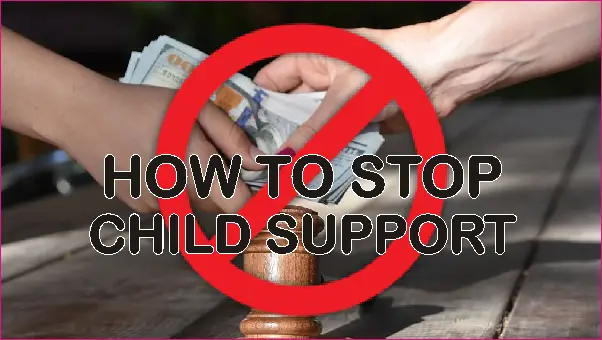
Despite being an obligation owed by parents to their children, there are situations where the non-custodial parent who pays child support to the custodial parent for the child’s upkeep may want to stop paying court-order payments for various reasons, either legally or by employing loopholes.
It can be exceedingly challenging to escape this obligation, and there are very few circumstances in which parents are relieved of this responsibility. You do have a few alternatives, though, if you really want to stop or reduce your child support payments.
While we do not advocate this, let’s examine some of the ways through which you can stop paying child support legally plus other secret loopholes which we discovered that also works. If you really have to stop paying child support, these are the secrets you need to know.
Can Child Support be Stopped or Modified?
Since child support is a court-ordered obligation, declining to make payments is against the law. The custodial parent may approach state and federal agencies for assistance if the non-custodial parent has stopped paying child support. The consequences are dire and may include wage garnishment and even jail terms.
If you stopped paying child support or are wondering, however, if you can legally stop child support, or by gaming the system through loopholes, then, YES, both parents can come to an agreement to stop or modify child support but they will need a court to seal their agreement before it becomes an order that supersedes the previous mandate.
Reasons Why Child Support Can Stop

Child support is very important for the upkeep of the child
There are a number of legitimate reasons to stop paying child support, despite the fact that the child support system was designed to make sure that separated or divorced parents supported their children until the appropriate time.
The main reason that fathers don’t pay child support is that they aren’t allowed to see their kids. Mothers on the other hand typically feel that no one will do them anything if they stopped.
Here are common valid reasons why non-custodial parents may want to stop child support payment orders:
The Child Reaches the Age of Maturity (18)
One common question that always crop up is, what age do you stop paying child support? Well, in most states, 18 is deemed the age of maturity and at this age, the non-custodial parent can stop paying child support unless a court expressly orders that it be continued.
Child Passes Away
When the child passes away, the child support will automatically stop since there is no one to support using the child support
Physical Custody Is Given to the Paying Parent
The paying parent will no longer be required to pay child support if custody is granted to them as a result of a reappraisal because they are likely providing the child with housing, food, clothing, education, etc. The other parent can now be responsible for paying if they lose physical possession. In this case, you can stop without using child support loopholes.
The Emancipation of the Child
The parent may ask to be emancipated from further obligation if the child does have legal means of sustaining themself. The court will carefully examine this important choice because it may expose the youngster.
Losing Parental Rights
Losing your parental rights has the same effect as gaining physical custody in terms of preventing you from having to pay child support. However, remember that you won’t be able to demand to see the child or make any decisions concerning him.
It’s vital to note that you cannot simply renounce your parental rights because you feel like it. You need to have your unsuitability for either reaching a settlement with your ex-spouse or being a parent established in court.
You Can’t Afford Paying Child Support
If you are having trouble paying your child support, contact your local court or a divorce attorney to request that the payments be stopped.
The Recipient’s Financial Situation has Changed
Because child support is calculated mostly based on the earnings of both parents, you can legally stop paying your part or have it modified if the other parent suddenly gets a boost in their finances.
Disagreements About Spending
Even though this can lead to legal trouble, it’s another reason parents stop paying child support, because they don’t agree on how the one they pay is being used. It could be that the custodial parent is also using part of the support payment to cater to themselves, and not just the child.
The Parents Get Back Together
If the parents resolve their differences and get back together, the paying parent may stop payment, as both of them will resume caring for the child the way that they used to do before the divorce.
How to Stop Paying Child Support?
To stop paying child support, seek a court-ordered modification due to changed circumstances, agree on a new support arrangement with the other parent, or in rare cases, terminate parental rights. Thought his might sound straight, it can be tricky, especially if you are not sure of how it’s done.
In this section, we will look at both legal ways and loopholes that you can use if you want to stop paying child support.
Stop Paying Child Support Legally

There are some Legal ways to stop child support payment
Apart from using child support loopholes, to stop child support legally, the parent must inform the court and apply for the stoppage of child support payments. But before you approach the court to stop paying child support legally, there must be viable reasons showing a “significant change in circumstances“. And you need to prove it to the court. Here are the steps you need to follow to make it hitch-free:
I. Gathering Evidence
The first step in the process of stopping child support payments legally is to gather evidence of your financial situation. This includes documenting your personal expenses and your new income. It is important to start tracking this information immediately so that you have documented and certified records to show the court that you are unable to afford the current order.
Tools such as SupportPay can be used to track expenses and income, and to organize financial records. It is also important to gather any other relevant financial information, such as pay stubs, tax returns, and bills. This will help to establish a clear picture of your current financial situation for the court.
II. Legal Process
Once you have gathered all the necessary evidence, you can initiate the process of stopping child support payments by requesting a modification of the child support order. This can be done by visiting your nearest family court (or the one that issued your current child support order). Speak to the county clerk and request the appropriate paperwork to cease child support payments. Fill out the form, then submit it to the court.
In this process, it’s advisable to have a lawyer to help you with the legal process, prepare the paperwork, and represent you in court. An attorney will also be able to advise you on the best course of action and on the likelihood of success in your case.
It’s possible that a judge or other court-appointed agent will try to persuade you not to cease paying child support. The court finds that your child’s continued payment of the utmost amount of financial support is in the best interests of the child before turning 18. You should be ready to justify the grounds for your decision to discontinue paying child support.
III. Possible Outcomes
The court will evaluate the evidence presented and decide whether or not to modify the child support order. The court will consider factors such as the parent’s income, the needs of the children, and the parent’s ability to pay.
If the court decides to modify the child support order, the new order will reflect the parent’s changed financial situation. If the court does not grant the modification, the parent will continue to be responsible for paying the current child support amount.
The court may enforce collection methods such as wage garnishment or even jail time. Therefore, it is important to seek legal advice before making any decisions. Here outlined below are the step by step ways to do these:
Steps to Stop Child Support Payment Legally
When you feel there are cogent and verifiable reasons to legally stop paying child support, you can’t just stop on your own or resort to loopholes. Doing so will violate a court order and can lead to contempt of court, which can ultimately land you in prison.
You can contact a family law attorney or follow the following steps to legally do it yourself. For any route you decide to follow, you must first read the original order issued by the judge to fully understand it. You may discover that your child support order might specify particular occasions or dates when child support can be stopped.
1. Working with the Child Support Agency
One way of doing this is to work with your child support agency. Here are the steps:
- A. Get in touch with your state’s enforcement office for child support.
Agency staff will be able to inform you of the precise actions you must follow, along with the required paperwork, to terminate your child support order. - B. Put together evidence to back up your assertion.
Get copies of any evidence that will help you demonstrate your kid no longer requires child support before you submit an application to have your child support order stopped. - C. Complete and submit the request to end the support order.
Before your child support order may be canceled, you must complete and submit the appropriate documents to each state office. - D. Help the agency out with its inquiry.
The agency will assess your application once you’ve submitted it and consider the justifications you’ve provided for why your child support obligation should terminate. - E. Obtain notification of the organization’s ultimate choice.
If your child support has been canceled or will continue, the agency will notify you in writing after examining your case.
2. Filing a Motion with the Court
You may optionally choose to approach the court and file a motion to stop paying child support. Here are the steps:
- A. Obtain Copies of the necessary forms.
To request the court to terminate your child support order, many courts offer fill-in-the-blank forms that you can obtain from the office of the clerk or download from the court website. These forms may include a child support termination form. - B. Compile any necessary documentation.
Copies of the original order and any other records or material that backs up your argument that child support should stop are required by the court. - C. Complete the paperwork.
Use the format given by the court to enter the information required completely and precisely. - D. Submit your paperwork to the proper court.
File your paperwork with your local court or the same court that granted the initial child support. - E. Show up to your hearing.
If the court sets a hearing for your application, you must show up or the court may dismiss it, in which case you will still be responsible for paying child support.
In most cases, the judge won’t order a hearing if you and the other parent agree that child support should be stopped. He will only put his signature on the agreed-upon order that you filed with the court along with your motion.
In many states, you may need to send a child support termination letter to the court stating the reasons for the stoppage, since you can’t just stop the order abruptly. The child support termination letter is a document that may be utilized when one of the parents (or legal guardians) wants to stop receiving child support (or pay). The letter’s request to end the child support order is sent to the proper court.
Child Support Loopholes

There are sneaky loopholes parents use to avoid child support
With child support loopholes, you’ll be able to avoid, reduce, or totally avoid child support payments. This could be by reporting changes in your income that impact your ability to pay your current order. These changes can include lost wages and increases in your household size.
The Child Maintenance Service (CMS) has loopholes that let many non-custodial parents avoid making the full amount of child support payments that they ought to, due to errors in the way parents’ income is assessed. Here are some sneaky loopholes exploited by parents to avoid paying child support:
1. Setting up Fake Companies
Non-custodial parents create fictitious businesses, pay their new partner’s salaries from their actual company to cut down on its revenues, and provide themselves with in-kind benefits or significant pension contributions.
2. Keep the proceeds from asset sales
When you share your assets, including expensive items like furniture, artwork, or other expensive items, you give your ex-spouse the option to sell those items and keep the proceeds. If your ex does sell the items for cash and does not disclose the income, he or she may have more money than the court believes, which could reduce the amount of support you receive each month.
3. Stack up balance on Credit card account
Bills from credit cards are regarded as expenses. Your ex may carry a high amount on their credit cards to give the impression that they are unable to make as much of a monthly payment to you and your family.
4. Empty bank accounts to conceal higher income.
Your ex’s declaration to the court about their respective income levels is regarded as a legal document. To make it simpler for them to reduce their monthly payments to you, some parents, however, try to deplete their bank accounts and retain all of their money in cash such that the court cannot see how much money they have.
In all these, however, do realize that there are severe consequences for not paying child support. When the law catches up with the defaulter, the penalty can be harsh, starting with harsh enforcement techniques to even jail.
Consequences of Failing to Meet Child Support Obligations
The legal obligation to provide financial support for one’s children is a serious matter that is enforced by the law. The punishment for not paying child support obligations can be severe, not only on the financial aspect but on personal relationships and legal standing as well. Below are some of the repercussions that may arise due to non-compliance with child support orders:
Legal Penalties
Failing to adhere to child support orders can result in various legal penalties. These may include fines, contempt of court charges, or even jail time. The exact penalties vary by jurisdiction but they underscore the importance of meeting child support obligations.
Wage Garnishment
Wage garnishment is a common consequence of unpaid child support. This means a portion of the non-custodial parent’s income will be directly withheld to cover the child support dues. This can significantly affect the individual’s financial situation and standard of living.
Tax Refund Seizures
Tax refund seizures are another way the government ensures child support payments are made. If you owe child support, your tax refund may be seized to cover the outstanding amount, which can be a significant financial setback.
Damage to Credit Score
Unpaid child support can be reported to credit bureaus, which will likely result in a lower credit score. A poor credit score can hinder your ability to secure loans, mortgages, or even rental agreements, affecting many aspects of your life.
License Suspensions
In many states, failing to pay child support can lead to the suspension of your driver’s license and/or professional licenses. This can greatly hinder your ability to work and carry out daily activities, further exacerbating the situation.
Denied Passports
If you owe a certain amount in child support, the State Department can deny your application for a passport. This can limit your freedom to travel and may impact your personal and professional life significantly.
Each of these consequences highlights the importance of adhering to child support orders and making payments in a timely and consistent manner. It’s crucial to understand the serious implications of failing to meet child support obligations and to take necessary steps to comply with the law.
Conclusion
While there may be a million reasons to stop paying child support, note that avoidance of a support order is illegal and comes with consequences. However, there are still many ways you can take if you want to stop paying child support, both legally and by exploiting some sneaky loopholes. Nevertheless, government agencies soon discover these and close the loopholes.




